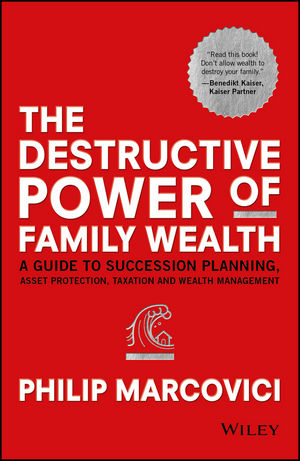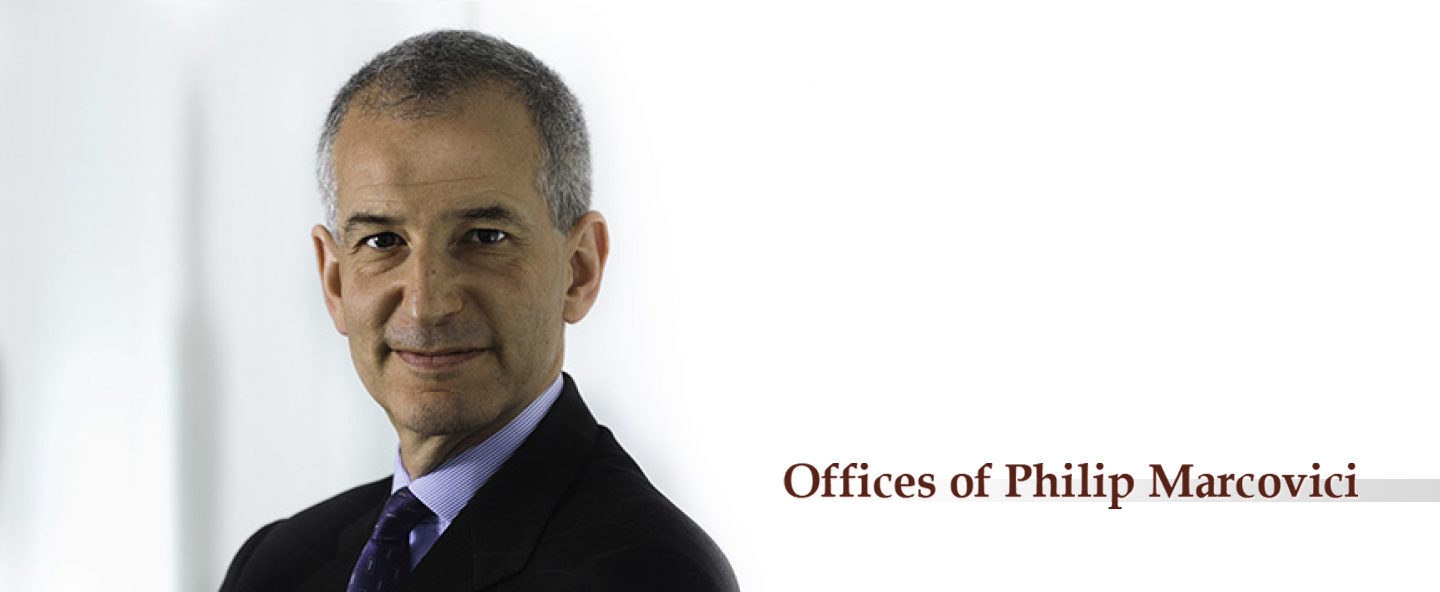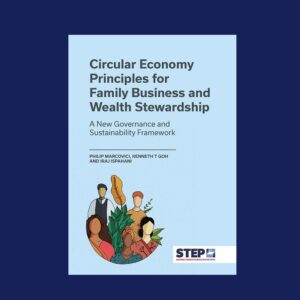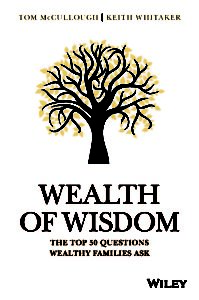The author of numerous tax and wealth management oriented publications, Philip Marcovici has also been a guest lecturer at the law school of Hong Kong University and at the Universities of Geneva, St. Gallen and Zurich. Philip has been an adviser to the Swiss Finance Institute and a lecturer on tax issues for the institute. Philip was a founding advisor to the Cambridge Judge Business School Executive Education division in relation to its Family Business and Family Office programmes.
Philip lectures worldwide and runs training and strategic change programs for a number of the worlds’ top private banks. Philip is also a member of the Advisory Committee of the Hong Kong University of Science and Technology’s Roger King Center for Asian Family Business and Family Office ( HKUST Roger King Center ). Philip is also a Founding Advisor to The University of Cambridge Institute for Sustainability Leadership in relation to a new programme entitled Multi-Generational Leadership: Equipping the world’s most influential families to shape the 21st Century. Multi-generational Leadership Programme Flyer
Philip has also been a guest lecturer at the Chinese University of Hong Kong, the Hong Kong University of Science and Technology and for the Tsinghua Kaifeng Family Heritage Centre in Beijing. Philip was formerly a member of the curriculum review committee for tax, trusts and wealth planning for the Singapore Wealth Management Institute, and is presently on the Editorial Board of WealthBriefing. Philip was also formerly a member of the adjunct faculties of Singapore Management University and Nanyang Technological University in Singapore (NTU) and a frequent lecturer for the Singapore Wealth Management Institute.
Philip is a consultant to the CFA Institute and a co-author of readings on private wealth management in the CFA curriculum.
Philip Marcovici’s book, The Destructive Power of Family Wealth – A Guide to Succession Planning, Asset Protection and Wealth Management was published by John Wiley & Sons and is available on Amazon and through other online and retail booksellers. Order NOW at Amazon or Amazon UK

Philip wrote this book to help families navigate the increasingly complex world of succession planning and asset protection, and to share his views on the state of the wealth management industry. Philip’s book also contains his views on strategy for private banks, trust companies and others in the wealth management industry looking for success in a time of enormous change and challenge.
A blurb from Philip’s publisher:
The Destructive Power of Family Wealth offers thoughtful, holistic planning to ensure that your wealth remains a positive force for your family. Global taxation regimes, changing bank secrecy laws, asset protection and other critical issues are examined in depth to assist wealth owners and their advisors in planning, and the discussion includes details on essential tools for any wealth management strategy. This book also delves into the psychology of wealth, and the effect it has on different family members; wealth destroys families every day, and smart management means maintaining the family as much as it means maintaining and expanding wealth.
Some reviews of the book include: December 2021, Journal of Wealth Management. Review by Paul Bouchey.
Review by Alex Scott of Sandaire
On Page 50 of Campden Family Business
The-Destructive-Power-of-Family-Wealth-Tim-Price
Article from Kaiser Partner Review
Review in the Society of Trust and Estate Practitioners Journal by Michael Olesnicky
Book Extracts – The Destructive Power of Family Wealth
Click Here for a Few Extracts From the Destructive Power of Family Wealth
Circular Economy Principles for Family Business and Wealth Stewardship
In this new publication, authors Philip Marcovici TEP, Kenneth T Goh and Iraj Ispahani pool their expertise to consider how circular economy principles apply to family business and wealth stewardship. They look at how wealth stewardship can provide a new approach to governance frameworks for wealth- and business-owning families. The mini-book can be downloaded for free on the website of the publisher, the Society of Trust and Estate Practitioners, or purchased in hard copy. See:
https://www.step.org/research-reports/responsible-stewardship-wealth
Selected Articles by Philip Marcovici
The Responsible Stewardship of Wealth
Philip Marcovici was the first chair of the Society of Trust and Estate Practitioners Thought Leadership Steering Group on the Responsible Stewardship of Wealth. Now chaired by Gina Pereira, Philip continues to be part of this STEP initiative and was, with Gina, a co-author of a Guide for Family Dialogues on this topic. The guide can be downloaded at:
https://www.step.org/Family-Dialogues-on-the-Responsible-Stewardship-of-Wealth-A-Guide
An article on the Guide is at Step Journal – Responsible stewardship of wealth
The Global Minimum Tax and Private Capital – Taxing Reality
In this article, Philip Marcovici, Samantha Morgan and Jefferson VanderWolk discuss the potential implications of a recent OECD move towards a global minimum tax for multinational corporations.
There has been much press about the move towards a 15 per cent global minimum tax for large multinational businesses. However, have wealth and business owners (and their advisors) realised that there is real potential for this initiative to affect private capital? The reality is that this new regime may be relevant for not only large multinationals but also for all wealth and business owners.
Although there is guidance in the works on how the new regime will be implemented, based on what has been published to date, wealth and business owners would be well advised to pay attention to expected developments and to prepare themselves accordingly. There are many reasons why it should be expected that upcoming guidance will clarify that typical trust and similar family holdings will be excluded, but wealth and business owners and their advisors need to be ready to navigate what will be a very complex regime. Trusts, foundations, family partnerships and holding companies can all, it appears, fall into scope. Although the global minimum tax is focused on groups with annual revenues of over EUR750 million, there is little assurance that in the years to come this revenue threshold will not decline. See: A taxing reality –
Sustainability Start at Home
Working with Iraj Ispahani and Prof. Kenneth Goh, Philip has been developing thinking around how business and wealth owning families can use principles of the circular economy to address decision making, governance and much more. As Philip, Iraj and Kenneth move forward with their work, an early article by them appears in Tharawat Magazine: Tharawat Magazine – Sustainability Starts at Home
https://www.ifb.org.uk/resources/for-owners/family-businesses-and-sustainability/
Cooperative Compliance Program For Individuals And Trusts: A Proposal For a Compliance Passport
Co-authored with Noam Noked of the Faculty of Law of the Chinese University of Hong Kong and published in the Journal of Tax Administration, this article develops a proposal for a voluntary tax compliance program for individuals, family trusts, and private investment vehicles. The proposal draws upon existing cooperative compliance programs for large corporations, such as the Organisation for Economic Cooperation and Development (OECD)’s International Compliance Assurance Programme (ICAP).
Under the proposed program, the authorities of the relevant jurisdictions would determine, on a joint basis, whether the participant is in full compliance with their tax obligations and whether there are any money laundering concerns. The implementation of this proposal could enhance a culture of cooperative compliance and free up enforcement resources. For participating wealth and business owning families, the approach would improve privacy, increase certainty, and reduce compliance costs and distortions. Published Article – Marcovici and Noked
Step Journal – Passports, please
Women: wealth and self-reliance
Written together with Caroline Underwood of the Philanthropy Company in London, this is a chapter of a book titled Family Business and Responsible Wealth Ownership: Preparing the Next Generation and published by Globe Law and Business. The book aims to develop a shared mindset and better understanding across and between the generations, focusing in particular on matters from the perspective of the next generation. To gain further insight around the themes and chapters covered, please click the link below.
Family Business and Responsible Wealth Ownership
Tax After Coronavirus – Evidence to UK Parliamentary Committee
Developing Global Britain as a Center for Responsible Business and Wealth Owners
Invited to provide evidence to a parliamentary inquiry examining the tax system following the reconstruction of the economy after the unprecedented economic fallout of the coronavirus crisis, this paper is a submission by Philip Marcovici. The parliamentary inquiry is reviewing what the major long-term pressures on the UK tax system are, what more the UK can do to protect its tax base from globalisation and technological change, and whether such pressures should be met with tax reform.
The paper outlines how Britain might move towards more firmly establishing itself as a forward looking center for responsible wealth and business owners and the immediate revenue raising steps that can be taken. The paper seeks to encourage the Government of the UK to consider taking steps to reform its tax system with a view to addressing the realities of income and wealth inequality while recognizing the important value to the UK of attracting and retaining wealth and business owners as citizens, residents and investors.
Minimizing Political Risk
White Paper – Political Risk Minimisation – October 2023
This article was written with Hussein Haeri of Withers, London, and Iraj Ispahani of Ispahani Advisory, and discusses political risk minimization and the need for families and family businesses to take political risk into account when structuring investments as well as their asset ownership structures. The paper was updated in April, 2020.
Philip has been actively involved political risk minimization projects for family business and wealth owners, as well as for private and listed companies since the 1980’s and is a frequent lecturer on the topic.
Why Estate Duty Would be a Good Thing for Hong Kong: Addressing Inequality
Time for a Shake-Up: Why Hong Kong Needs Estate Duty
This article was published in the Journal of the Society of Trust and Estate Practitioners and discusses why Hong Kong should reinstate Estate and Donation Duties. Wealth owners have responsibilities to society, and growing inequality is a reality that we all share a responsibility to address. A shorter version of this article was published in the South China Morning post and co-authored with Stefano Mariani of Deacons in Hong Kong. See: South China Morning Post Article – Estate Duty and Inequality
Global Tax Transparency and the Need for Effective Dialogue
Global moves to tax transparency are a good thing, but not all countries are ready for tax transparency. We need to consider how to deal with this as developing countries in particular will suffer under the new Common Reporting Standard and other transparency initiatives.
In two parts, these articles appeared in the World Financial Review.
TWFR Part 1 Global Tax Transparency by Marcovici
TWFR Part 2 Global Tax Transparency by Marcovici
Wealth of Wisdom – The Top 50 Questions Wealthy Families Ask – With a Contribution by Philip Marcovici on How to Choose Trusted Advisors – Listen to the Podcast!
Link to a Podcast on How to Choose Trusted Advisors: Philip Marcovici on Choosing and Working with Advisors
We need advisors, but need to learn how to use them safely and efficiently!
Estate and Donation Duties in Hong Kong: Society of Trust and Estate Practitioners Hong Kong Branch Newsletter, January, 2019
Estate and Donation Duties for Hong Kong
More on Estate and Donation duties for Hong Kong as a step towards addressing income and wealth inequality.
Family Offices Become Financial Titans – Comments by Philip Marcovici – The Economist, December 13, 2018
Articles in The Economist on perceived evils of family offices – in interviews by the Economist, Philip Marcovici defended family offices, emphasizing that they are more of a force for good than generally understood. But income and wealth inequality is an issue that needs to be addressed.
Family Offices Become Financial Titans
Something Different, But Important: Qigong Meditations
Another book by Philip Marcovici, Qigong Meditations, published in 2007. Design by Sandra d’Auriol and photographs by award winning photographer, Almond Chu.
Qigong is a simple Chinese breathing exercise that provides health and spiritual benefits. This work features instruction on Qigong, accompanied by gorgeous black and white photography. The book provides an introduction to the subject, and sets out exercises. Very limited availability left on Amazon, so contact Philip if you are interested in buying one of the few copies left! Contact Philip




